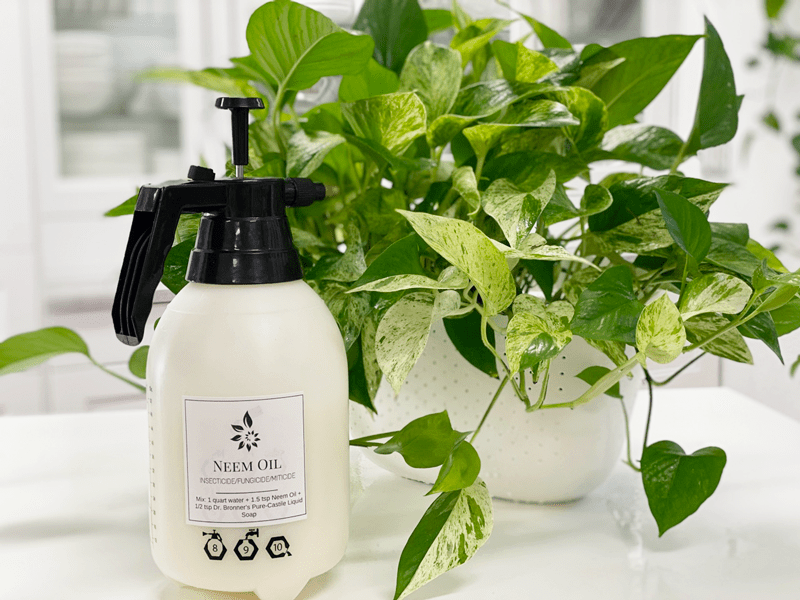No products in the cart.

The Neem Tree, which belongs to the mahogany family, produces Neem oil. The tree is native to areas of India and Africa. It is derived from several sections of the tree, and it is also used to make soaps, lotions, and cosmetics. Because the seeds have the maximum concentration of insecticidal qualities, they are crushed to make the oil. Gardeners like to use Neem oil to get rid of pests and fungi from their plants because of this. Its insecticidal properties enable it to not only eliminate pests but also to keep them at bay. It also makes laying eggs more challenging for these animals. Neem oil in concentrated form is readily accessible. It comes in bottles and may be found at a variety of shops. However, because the initial concentration is too strong for the plants, it must be diluted with water before being used as an organic insecticide. It can harm the plant by creating leaf burns on its own.
Homemade Castile soap plant spray, on the other hand, may be used to control aphid numbers or eliminate small, soft-bodied creepy crawlies like white bugs, insects, spider mites, and ladybugs. Petroleum or, more often, essential oils from plants are used to make castile soap sprays. When you spray the mixture on the plants using a spray bottle, the fatty acids disintegrate the soft-bodied insects and destroy them. The insect's cell layers are disrupted by certain liquid castile soap mixtures, causing them to suffocate. They can also be used to keep soil wet. Petroleum or, more often, essential oils from plants are used to make castile soap sprays. When you spray the mixture on the plants using a spray bottle, the fatty acids disintegrate the soft-bodied insects and destroy them.
Neem and Castile oil do not dissolve in water on their own. If applied alone, it will float on the water's surface. It is necessary to use an emulsifier (dish soap or Castile soap) that binds to Neem oil droplets and evenly distributes the molecules in the water. Insects, bugs, spider mite, insect pests, and lice are among the most common garden pests that may be controlled using Neem oil. It is also efficient against 200 other pest species, insects, and bugs that feed or drink from plants. It is most effective against soft-bodied bugs since the Neem oil and water mixture coats their bodies and kills them. It also makes it impossible for them to feed and reproduce. Direct touch, however, is the key to its success. This is when it is most effective against certain bugs. The best part about Neem oil is that it is safe for helpful insects like butterflies, earthworms, bees, and ladybugs. Again, the trick is to avoid spraying it directly on them. This is why most gardeners apply Neem oil later in the day, particularly at night when beneficial insects are less active. They are therefore protected against "friendly fire" threats.
Neem oil is also a powerful fungicide that is why many farmers use it to treat and prevent mildew, fungus, black spot, blight, leaf spot, botrytis, rusts, and a variety of other diseases. It protects plants from fungal infections by making them less susceptible to them and preventing them from spreading. However, its antibacterial efficiency is quite comparable to its insecticides efficiency. After all, it is most useful in the preventive and early phases of disease. When a disease epidemic is in full stride, it becomes less effective.
The ideal usage of Neem oil with castile soap is as a preventative strategy for skin care also. As a result, it is highly effective in repelling and keeping pests away from plants that are more sensitive. Spraying plants with Neem oil instead of synthetic pesticides is a better option. Many pesticides on the market include potentially harmful compounds that might harm your health. Aside from the risks associated with synthetic pesticides, many plant pests develop resistance to them. Furthermore, many insecticides include poisons that kill both beneficial and pest insects. Because Neem oil spray has fungicidal characteristics, it can be used to treat powdery mildew and other fungal plant diseases. Leaf spot, tip blight, black spot, and scab are some of the other fungal diseases that Neem oil naturally treats. Spray the leaves monthly until the fungus symptoms are gone for good to eliminate fungal diseases from foliage. The use of Neem oil as a fungicide has the advantage of being safe for vegetables and fruits. The residue on plants has no negative consequences. However, you should wash them before eating them, as you do with other fruits and vegetables. Using Neem oil and Castile sprays on garden plants to eliminate bacterial infections is another option. Fire blight, for example, kills plant foliage, causing it to wilt and rot. To help stop fire blight, use Neem oil as a passive spray.
